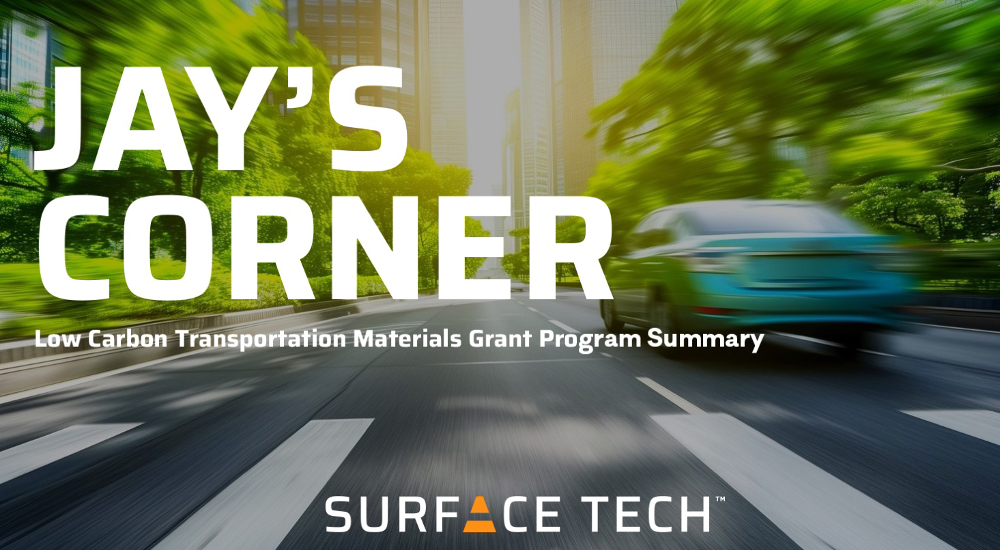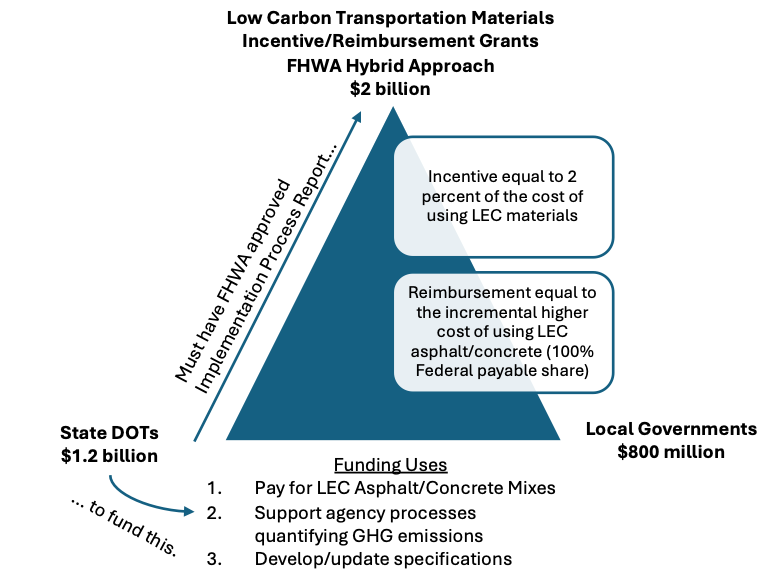
Asphalt Industry Needs to Support Buy Clean Policies
The final piece of President Biden’s Inflation Reduction Act’s (IRA) Federal Buy Clean initiative became clear when the Federal Highway Administration (FHWA) announced on March 12, 2024 how its $2 billion program to accelerate the use of low-embodied carbon (LEC) materials will be implemented. The Environmental Protection Agency (EPA) and General Services Administration (GSA) have already issued policy documents, guidance, project, and grant announcements as part of the Federal Buy Clean rollout supported by the IRA legislation.
Per the announcement, the Low Carbon Transportation Materials Grant Program (LCTM) is now accepting grant applications from state transportation agencies to fund “activities” and “projects” that reduce emissions through the use of low-embodied carbon materials. According to the press release, FHWA is taking a hybrid approach to implement the program as follows:
- $1.2 billion is available to the states, DC, and Puerto Rico and can be applied for now under the “Request for Application (RFA) program announced by FHWA.
- $800 million will be made available later this year for metropolitan planning organizations and local governments to participate in the program through a Notice of Funding Opportunity (NOFO).
Key Takeaways from Announcement
- Each state is eligible for at least $22 million in grant funding.
- LCTM applications due June 10, 2024.
- Each state to submit only one application identifying projects to FHWA for consideration.
- Only asphalt mix, concrete, steel, and glass eligible for funding
- LCTM funds must be obligated by September 30, 2026
- LCTM funds must be spent by September 30, 2031
- Unused funds will be made available to other states
How Agencies Determine “Substantially Lower” Embodied Carbon Thresholds
Under the LCTM program, EPA determines what is an acceptable LEC material. Thus, the process an agency uses must be in alignment with EPA’s Interim Determination (i.e., best performing 20 percent, 40 percent, and industry averages.) FHWA allows for one of two options that may be combined for agencies to consider:
- Industry average information posted on FHWA’s website (available in Spring 2024); or
- Agency determines GWP thresholds utilizing accepted ISO standards.
Implementation Process Report (IPR)
The first step each DOT will have to consider to access LCTM funds is to prepare an Implementation Process Report. This report documents how the state DOT plans to implement LCTM activities and increase use of LEC asphalt/concrete. The IPR must be submitted and approved by FHWA before funding under the LCTM program is authorized.
What Asphalt Companies Should Be Doing
For asphalt companies interested in growing their asphalt mix market, or additive companies who supply low carbon technologies to asphalt companies, the time to meet with state DOT staff is now. Will the state DOT submit a responsive application to FHWA? What low carbon technologies will the state DOT include in the application that will be eligible for reimbursement? Time is running out so act fast. Download (click here) this handy one-pager developed especially for the additive industry to serve as a guide to the LCTM Grants Program.


ABOUT THE AUTHOR
Jay Hansen joined Surface Tech following a long and distinguished career at the National Asphalt Pavement Association and in the U.S. Congress where he worked on legislation from the Intermodal Surface Transportation Act (ISTEA) in 1991, to the Infrastructure Investment and Jobs Act (IIJA) in 2021. Jay will serve as an ongoing resource for Surface Tech customers to help them get ahead of the growth curve and be ready for shifting market conditions as they occur in 2023 and beyond.

